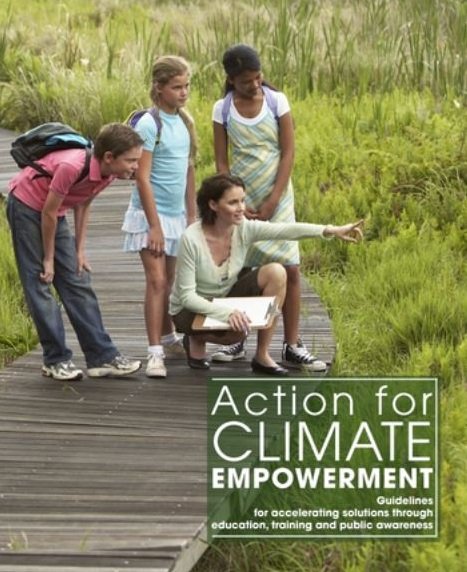Collaborating on ACTION FOR CLIMATE EMPOWERMENT (ACE)
A crucial UN Goal that calls for museum support.
What is ACE?
Action for Climate Empowerment (ACE) is a term adopted by the UNFCCC to denote work under Article 6 of the Convention and Article 12 of the Paris Agreement. [1] ACE encompasses action to empower all members of society to respond effectively to the climate crisis. Enabling public awareness, climate change education and participation in solutions, ACE is necessary for achieving and progressing climate action.[2] As the UNFCCC states, implementation of the 6 elements of ACE (below) is crucial, ensuring that:
…everyone, across all walks of life, understands the causes and impacts of climate change, and is educated, equipped and empowered to contribute to effective actions that drive mitigation, adaptation and resilience. [3]
How is action progressing?
ACE is gaining ground, from climate education now being mandatory in schools in Italy and Mexico to a proliferation of independent radio programs, government media campaigns and early-warning systems, to training programs for young people in Rwanda and Tanzania for jobs in renewable energy. [4]
The new Glasgow Work Programme for ACE (2022) sets out a framework for action and reporting.[5] National ‘Focal points’ (contact people in relevant national government departments)[6] have been identified and at recent COPs, and ‘Dialogues on Action for Climate Empowerment’ provide a forum for stakeholders to share experiences, ideas and lessons learned.[7] The UNFCCC is working to establish ‘broad collaboration between all levels of government and all sectors of society’. [8]
Cultural Institutions and ACE
Museums and other cultural institutions are ideally placed to advance Action for Climate Empowerment, and an increasing number around the world are doing so.
Increasingly, cultural institutions are communicating in engaging ways about the climate and biodiversity crises and highlighting solutions. Through exhibitions, programs for schools and the public, conversation events, social media, online resources and publications - cultural institutions are helping audiences to find pathways to action.
ACE supports the Sustainable Development Goals (particularly Quality Education and Climate Action) some institutions are already pursuing.
Some key resources
Henry McGhie has developed an excellent Handbook for cultural institutions wanting to advance ACE.
See also the Toolkit produced by Museums for Climate Action.
References
[1] UNFCCC, ‘Action for Climate Empowerment’, website accessed 20 Feb 2023, https://unfccc.int/ace
[2] UNFCCC, ‘Action for Climate Empowerment’, https://unfccc.int/ace
[3] UNFCCC, ‘Action for Climate Empowerment’, https://unfccc.int/ace
[4] UNFCCC, ‘What is ACE?’ blog, 21 June 2021. https://unfccc.int/blog/what-is-ace
[5] UNFCCC, ‘Glasgow Work Programme for Action for Climate Empowerment’, published 31 Nov 2021, https://unfccc.int/documents/310465
[6] UNFCCC, ‘National Focal Points’, https://unfccc.int/topics/education-youth/national-ace-focal-points
[7] UNFCCC, ‘Dialogues on Action for Climate Empowerment’, https://unfccc.int/ace-dialogues
[8] UNFCCC, ‘Action for Climate Empowerment’, https://unfccc.int/ace



